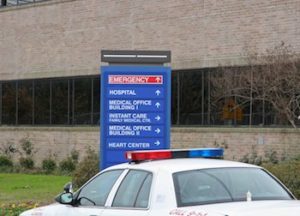 In the last few months a Colorado District Attorney and the Wisconsin Attorney General have asked the U.S. Supreme Court to clarify an issue that could change the way felony DUI cases are handled. The issue in question is whether the constantly lowering rate of blood-alcohol content is justification to draw blood without a search warrant. The underlying debate falls under the 4th Amendment, regarding unreasonable search and seizure, among other things.
In the case of Colorado v. Schaufele there is debate about the evidence gathered by a police officer after Schaufele was in an auto accident and believed to be under the influence of alcohol. After the accident, while Schaufele was in the hospital and unresponsive, an officer had a nurse draw blood for alcohol-content analysis. Mr. Schaufele argued that because the officer did not get a search warrant for the blood analysis, it was an illegal search and breached his 4th Amendment rights. The district court suppressed the blood alcohol evidence because no search warrant was issued and the Colorado Supreme Court agreed with the district court’s suppression.
The U.S. Supreme Court will hopefully be reviewing this case soon and will clarify what circumstances are required before law enforcement can forcibly withdraw blood. Until the Supreme Court weighs in, law enforcement officers will have to interpret what “exceptional circumstances” will allow them to sidestep your 4thAmendment rights.
If you have a DUI case where blood was drawn and analyzed without your consent or a search warrant, our attorneys might be able to help. Give us a call at (720) 542-6148.
In the last few months a Colorado District Attorney and the Wisconsin Attorney General have asked the U.S. Supreme Court to clarify an issue that could change the way felony DUI cases are handled. The issue in question is whether the constantly lowering rate of blood-alcohol content is justification to draw blood without a search warrant. The underlying debate falls under the 4th Amendment, regarding unreasonable search and seizure, among other things.
In the case of Colorado v. Schaufele there is debate about the evidence gathered by a police officer after Schaufele was in an auto accident and believed to be under the influence of alcohol. After the accident, while Schaufele was in the hospital and unresponsive, an officer had a nurse draw blood for alcohol-content analysis. Mr. Schaufele argued that because the officer did not get a search warrant for the blood analysis, it was an illegal search and breached his 4th Amendment rights. The district court suppressed the blood alcohol evidence because no search warrant was issued and the Colorado Supreme Court agreed with the district court’s suppression.
The U.S. Supreme Court will hopefully be reviewing this case soon and will clarify what circumstances are required before law enforcement can forcibly withdraw blood. Until the Supreme Court weighs in, law enforcement officers will have to interpret what “exceptional circumstances” will allow them to sidestep your 4thAmendment rights.
If you have a DUI case where blood was drawn and analyzed without your consent or a search warrant, our attorneys might be able to help. Give us a call at (720) 542-6148.
DUI Suspicion and B.A.C.

Over the past few months, legal authorities in Colorado and Wisconsin have raised a pressing question that could potentially reshape how felony DUI (Driving Under the Influence) cases are handled across the United States. At the heart of this issue is the debate over whether the continuously decreasing threshold for blood-alcohol content (BAC) serves as sufficient justification for law enforcement to draw blood from a suspect without first obtaining a search warrant. This complex legal dilemma delves into the realms of the Fourth Amendment, which safeguards citizens against unreasonable search and seizure, among other protections.
One notable case that has thrust this issue into the spotlight is Colorado v. Schaufele. The case revolves around the evidence gathered by a police officer after an auto accident involving Mr. Schaufele, who was suspected of being under the influence of alcohol at the time of the incident. Following the accident, while Mr. Schaufele was in the hospital and unresponsive, an officer instructed a nurse to draw blood for alcohol-content analysis without securing a search warrant. In response, Mr. Schaufele argued that this warrantless blood draw constituted an illegal search and violated his Fourth Amendment rights. The district court sided with Mr. Schaufele, suppressing the blood alcohol evidence, and the Colorado Supreme Court subsequently affirmed the district court’s decision.
However, this legal dispute may soon find its way to the highest court in the land, the U.S. Supreme Court, which has the potential to provide much-needed clarity on the matter. The Supreme Court’s decision will be instrumental in defining the circumstances under which law enforcement can forcibly withdraw blood without violating a suspect’s Fourth Amendment rights. Until the Supreme Court renders its verdict, law enforcement officers across the nation will be left to interpret what constitutes “exceptional circumstances” that could potentially allow them to bypass a suspect’s Fourth Amendment protections.
In this uncertain legal landscape, individuals who have found themselves facing DUI charges where blood was drawn and analyzed without their consent or a search warrant may wonder about their legal recourse. If you or someone you know is caught in such a situation, it is crucial to seek professional legal advice and representation.
This is where Thomas & Ahnell, LLC, a renowned law firm specializing in alcohol and drug-related driving offenses in Colorado, can play a pivotal role. With a team of experienced attorneys well-versed in the intricacies of DUI cases, including those involving blood draws, Thomas & Ahnell, LLC, can offer invaluable guidance and advocacy.
The legal challenges surrounding DUI cases, particularly when it comes to issues of search and seizure, demand a thorough understanding of both federal and state laws. The outcome of these cases can have far-reaching consequences, affecting a person’s freedom, driving privileges, and reputation. With their extensive knowledge and experience, the legal experts at Thomas & Ahnell, LLC, are equipped to navigate this complex terrain, seeking to protect the rights and interests of their clients.
Conclusion
In conclusion, the ongoing legal debate regarding the justification for warrantless blood draws in DUI cases underscores the importance of understanding and upholding constitutional rights, especially those enshrined in the Fourth Amendment. While the U.S. Supreme Court’s eventual decision may provide clarity, the need for expert legal counsel remains crucial for individuals facing DUI charges. Thomas & Ahnell, LLC, stands ready to assist those in need, offering professional guidance and representation in alcohol and drug-related driving offense cases in Colorado. If you or someone you know is grappling with such legal challenges, don’t hesitate to contact Thomas & Ahnell, LLC, at (720) 542-6148 for assistance. Your rights and future prospects deserve the best possible defense.
Do you have further questions or concerns? Call us or contact the attorneys at Thomas & Ahnell, LLC, and we will be happy to help.
